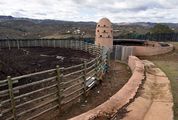IT’s hard to predict what’s going to happen to Europe. Although the Greek crisis seems to be heading towards some sort of resolution — if only for the short term — it’s still worth looking for investment opportunities under different scenarios — something that Keith McLachlan, fund manager at AlphaWealth, has obviously been doing.
"The eurozone risks fragmenting and potentially imploding in slow motion," says Mr McLachlan in the latest post on his website. "The euro finds itself at a crossroads.... Down the one road the eurozone remains intact, in which case the euro will likely strengthen significantly as fears of its existence ease, while down the other road the eurozone implodes and each country will move back to its own original currency."
While the first road is easy to understand, what happens down the second road? The answer is simple enough. Some of the currencies will instantly depreciate to reflect the weak underlying economies they represent, like the Italian lira or the Spanish peseta. Others will likely see their currencies become far stronger than the current euro. Germany is a good example.
As McLachlan points out: "German gross domestic product is powering ahead, its manufacturing and export sectors are hitting record volumes with trade surpluses being reported every month. In essence, Germany’s exporters are being subsidised by the weak countries in the eurozone that create a weak euro and make German exports all the more competitive…. If the eurozone implodes and Germany moves back to its original currency, one can expect the deutsche mark to appreciate dramatically (and) every deutsche mark-denominated asset to instantly be worth significantly more…. Hence the reason, we are seeing the market pricing German government bonds (called bunds) with a negative yield. The market is factoring a premium into these bunds, as holding them gives an investor a deutsche mark-denominated option on the eurozone fragmenting (in which case these bunds will be worth significantly more)."
McLachlan believes German assets currently hold a lot of value and will gain even more in value whatever happens to the eurozone. If it holds together, the euro will strengthen and German assets will do well. If the eurozone fragments, German assets will become deutsche mark-denominated and again do well.
To make things even more interesting, he goes on to say that there is a way to get a "German option" without forfeiting a yield on our own stock market. "That’s through listed property, specifically through Redefine International and Sirius Real Estate."
To quote: "Firstly, Redefine International has about a third of its portfolio in Germany (the remainder in the UK and a little in Australia) and offers a yield of c5% in the market.
"The beauty of Redefine International’s underlying properties is that their yields are in hard currency, thus they provide a long-term rand hedge. Even if Redefine International’s pound-based distribution only grows 3% to 6% per annum, the average potential depreciation of the rand will drive this growth up to about 10% to 13% per annum for a South African investor.
Moving on to the other viable "deutsche mark option", he says: "Sirius Real Estate is a 100% German portfolio. They like buying old business parks and converting them to essentially micro-tenantable flexi-space, while they do hold some more traditional yielding properties in their portfolio.
"This means that Sirius is not comparable to pure listed property plays and that it involves a higher level of risk with a lower yield (c3.6%), albeit with a higher potential return attached to this growth/development angle.
"The only point being made here is that it (along with Redefine) provides investors a free option on the deutsche mark.
"Sirius is a much purer German option than Redefine International, albeit at a lower yield and a higher risk. Depending on your risk appetite one might sound better than another, but I do think that positive-yielding property is more attractive than negative-yielding bunds for accessing a free option on Germany’s future.
"And, as Europe’s problems are far from over, I do think getting a free option on the deutsche mark is not an unattractive investment," says McLachlan.
Those investors who like to invest for yield rather than speculate in the hope of a rise in the share price might want to take a look at MICROmega.
Last Thursday the group’s executive chairman, Dave King, made a presentation to investors that was obviously well received. The promise was one of continued growth and the analysts and fund managers who attended agree the group’s prospects are bright — especially for Nosa, the health and safety services business operating in China and Latin America. As well as for Utility Systems, a leader in smart water management, which commands about 90% of the electronic flow-limitation market in the Southern African Development Community area.
However, some of those fund managers also went on to say that while they would happily put their own money into MICROmega they were reluctant to do the same with their clients’ money. For the simple reason that if the share price stumbles they would be likely to face a barrage of self-righteous indignation. Investors were apparently hurt when King sold his shares in a previous listing (Specialised Outsourcing) at a substantial profit, subsequently followed by a long drawn-out battle with the South African Revenue Service that ended in a R718m settlement and did nothing to help his public image.
However, for those of us who don’t have to explain our investment decisions to others, and prefer to look ahead, that hesitation creates the opportunity to buy into a company that will provide significantly better than average returns if management achieves its stated objective of continuing to achieve high growth in headline earnings while simultaneously generating cash and paying out dividends.
This, as Dave King noted last week, "is a big challenge that very few companies in the world are able to do, but we would like to".





















Post a comment